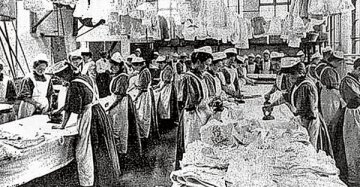"All We Could Think of Is We Are Going to Die Here. That Was an Awful Thing to Carry"
By Joe Humphreys
Women admitted to Magdalene laundries described to the committee the “harsh and physically demanding” conditions in which they worked, with routine punishments for slacking or breaking silence during work. “The overwhelming majority . . . described verbal abuse and being the victim of unkind or hurtful taunting and belittling comments,” the committee found. While a small number of women reported physical abuse, many more said they were subjected to “mental cruelty”. One of the biggest grievances was “complete lack of information about why they were there and when they would get out”. One woman said: “In our heads, all we could think of is we are going to die here. That was an awful thing to carry.” Of 118 women who spoke to the committee, one said she was sexually abused during her time in a laundry. She said her abuser was one of the auxiliaries, otherwise known as “consecrates” or “magdalenes”. These were women who, having entered a laundry, decided to remain there for life. Of the abuse, the woman said she “was not aware of this happening to anyone else”. ‘Widespread brutality’ The committee indicated that a large majority of the women who shared stories said they had “neither experienced nor seen other girls or women suffer physical abuse” at the laundries. “In this regard, women who had in their earlier lives been in an industrial or reformatory school drew a clear distinction between their experiences there and in the Magdalene laundries, stating clearly that the widespread brutality which they had witnessed and been subjected to in . . . schools was not a feature of the Magdalene laundries.” A number of women said they were physically punished for not working hard enough or for misbehaviour. These were typically a “rap” on the knuckles, being sent to bed without supper or having to kneel for hours. But some described harsher punishments, including punching and hair-pulling. One woman who wet her bed said nuns “pinned the sheet” to her back as punishment. Contrary to one widespread assertion about the laundries, none of the women said their heads had been shaved, with one exception – in a case of head lice. Some reported that it had been cut on entry, however, and described this as upsetting and degrading. It was the “ultimate humiliation”, said one woman. “It changed me as a person to authority, God forgive me I learned to hate people then.” The committee stressed that the number of women it interviewed represented just a small sample of admissions and therefore it “cannot be considered representative”. It was also “biased towards more modern years – the 1940s was the earliest period for which the committee had access to the direct experience of women”. Virtually no free time Religious orders told the committee that the working day was typically 9am to noon and 1pm to 5pm but this was contradicted by the majority of women who said they had virtually no free time. Even in “recreation time you were making beads and Aran sweaters”, said one. In addition, a Sisters of Mercy rule book indicated the working day was typically 8.30am-7pm, with just two breaks of 50 minutes and 15 minutes. In the early years the rosary was recited during the working day and periods of silence were observed. Daily Mass was an ever present, and favouritism was shown to women thinking of entering religious life. ‘Screamed to get out’ Of the conditions, the women said that throughout the day they were dripping in sweat from the heat of the laundries, while in the evening they would have to sit and sew in silence. “Some of them were only young girls while carrying out this heavy and difficult work,” the committee noted. One woman who worked in three laundries said she was “so short I needed a stool to put washing in. One day I fell in and the lid snapped down. I screamed to get out.” Another recalled: “At about eight o’clock you’d really drop. You’d be soaking wet.” If you were ever caught talking “you’d be moved to other end of laundry”, she added. “It was so regimental you learned not to ask questions or complain,” a third woman said. “Talking was a thing that was seen as sinful.” The committee also heard that visitors and letters were closely screened or controlled by the nuns. Women were not consulted about their futures, and often told on the day of departure that they had been placed elsewhere, typically in live-in jobs at hospitals or other institutions. Some nuns came in for praise, too, for acts of kindness or a relaxed approach to the rules, with one woman recalling that she was allowed to “pin up the Beatles on my wall”. ‘Sensitive issue’ The committee said “in light of the small sample of women available” it was not making specific findings about conditions in the laundries. Describing this as “a particular sensitive issue”, it noted the “absence of direct information has been largely replaced by historical (pre-State) experience and fictional writings or representations. It is also likely that assumptions have been made regarding these institutions based on the evidence of the grievous abuse suffered by male and female children in industrial and reformatory schools in Ireland throughout the twentieth century.”
|
.
Any original material on these pages is copyright © BishopAccountability.org 2004. Reproduce freely with attribution.
